Related Research Articles

Uttar Pradesh is a state in northern India. With over 240 million inhabitants, it is the most populated state in India as well as the most populous country subdivision in the world. It was established in 1950 after India had become a republic. It was a successor to the United Provinces (UP) during the period of the Dominion of India (1947–1950), which in turn was a successor to the United Provinces (UP) established in 1935, and eventually of the United Provinces of Agra and Oudh established in 1902 during the British Raj. The state is divided into 18 divisions and 75 districts, with the state capital being Lucknow, and Allahabad (Prayagraj) serving as the judicial capital. On 9 November 2000, a new state, Uttaranchal, was created from Uttar Pradesh's western Himalayan hill region. The two major rivers of the state, the Ganges and its tributary Yamuna, meet at the Triveni Sangam in Allahabad, a Hindu pilgrimage site. Other notable rivers are Gomti and Saryu. The forest cover in the state is 6.1 per cent of the state's geographical area. The cultivable area is 82 per cent of total geographical area and net area sown is 68.5 per cent of cultivable area.

Kanpur formerly Cawnpore is an industrial city in the central-western part of the state of Uttar Pradesh, India. Founded in 1207, Kanpur became one of the most important commercial and military stations of British India. Kanpur is also the financial capital of Uttar Pradesh. Nestled on the banks of Ganges River, Kanpur stands as the major financial and industrial centre of North India and also the ninth-largest urban economy in India. Today it is famous for its colonial architecture, gardens, parks and fine quality leather, plastic and textile products which are exported mainly to the West.
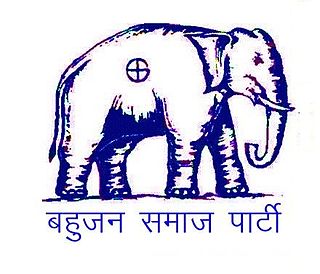
The Bahujan Samaj Party (BSP) is a national level political party in India that was formed to represent Bahujans, referring to Scheduled Castes, Scheduled Tribes, and Other Backward Classes (OBC), along with religious minorities. According to Kanshi Ram, when he founded the party in 1984, the Bahujans comprised 85 percent of India's population, but were divided into 6,000 different castes. The party claims to be inspired by the philosophy of Gautama Buddha, B. R. Ambedkar, Mahatma Jyotiba Phule, Narayana Guru, Periyar E. V. Ramasamy and Chhatrapati Shahuji Maharaj.
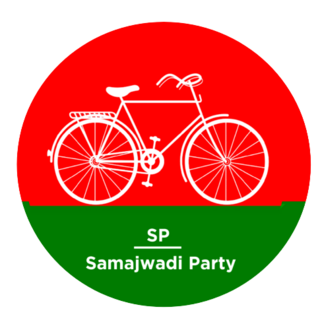
The Samajwadi Party is a socialist political party in India. Headquartered in New Delhi, the party is based in Uttar Pradesh with a significant presence in other states too. With a secular and democratic ideology, the Samajwadi Party believes in creating a socialist society, which works on the principle of equality. The party has been able to form the government in the state of Uttar Pradesh four times - three times under Chief Minister Mulayam Singh Yadav, the fourth and most recent being Chief Minister Akhilesh Yadav’s full majority government in the 2012-2017 Uttar Pradesh Legislative Assembly. The coalition of party and its alliance partners SP+ has one of the largest vote bases in the state of Uttar Pradesh in terms of the collective voting pattern in the state-based electoral system, with more than 37% vote share in the 2022 elections.

Kalyan Singh was an Indian politician and a member of the Bharatiya Janata Party (BJP). He served twice as the Chief Minister of Uttar Pradesh and as a Member of Parliament. He was the Chief minister of Uttar Pradesh during the demolition of the Babri Masjid in December 1992. He was considered an icon of Hindu nationalism, and of the agitation to build a Ram temple in Ayodhya.
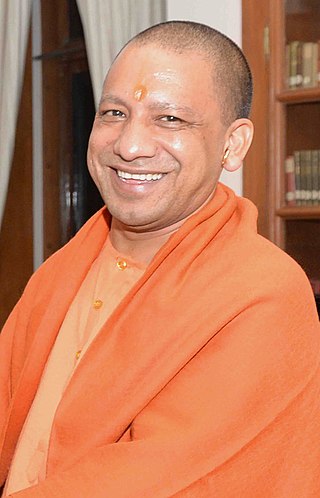
Yogi Adityanath is an Indian Hindu monk and politician from Bharatiya Janta Party who is serving as the 21st and current Chief Minister of Uttar Pradesh since 19 March 2017. He is also the longest serving Chief Minister of Uttar Pradesh, who is currently running his tenure for over 6 years, surpassing Sampurnanand. He is a former Member of Parliament, Lok Sabha from Gorakhpur constituency, Uttar Pradesh, for five consecutive terms from 1998 to 2017 before he resigned to become the Chief Minister.
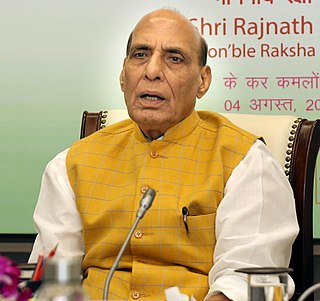
Rajnath Singh is an Indian politician and lecturer who is serving as the 29th Defence Minister of India since 2019. He is currently the deputy Leader of the House, Lok Sabha since 2014. He is the 8th President of Bharatiya Janata Party from 2013 to 2014 and from 2005 to 2009. He has previously served as the 19th Chief Minister of Uttar Pradesh from 2000 to 2002 and a Cabinet Minister for Road Transport and Highways in the Vajpayee Government from 1999 to 2000 and the minister of Agriculture from 2003 to 2004. He was the 30th Home Minister in the First Modi Ministry from 2014 to 2019. He is a veteran leader of the BJP who started his career as a RSS Swayamsevak. He is an advocate of the party's Hindutva ideology. He has also served the party in the Uttar Pradesh state from where he started his political career.He was the President of Bharatiya Janata Yuva Morcha from 1988 to 1990.He was a member of Uttar Pradesh Legislative Assembly from Haidergarh twice, being Chief minister.He was a member of Lok Sabha from Lucknow since 2014 and Ghaziabad from 2009 to 2014.He was also a member of Rajya Sabha from 2002 to 2008 and from 1994 to 2001.

Mukhtar Ansari is an Indian gangster turned politician from Uttar Pradesh. He has been elected as a Member of the Legislative Assembly from the Mau constituency five times, including twice as a Bahujan Samaj Party candidate.He is the relative of former Vice- President Mohamed Ansari.
Crime in India has been recorded since the British Raj, with comprehensive statistics now compiled annually by the National Crime Records Bureau (NCRB), under the Ministry of Home Affairs (India) (MHA).

The Uttar Pradesh Police, , is the primary law enforcement agency within the Uttar Pradesh state of India. Established in 1863 as the Office of the Inspector General of Police, United Provinces under the Police Act, 1861. It is headed by Director General of Police (DGP).

The National Investigation Agency (NIA) is the primary counter-terrorist task force of India. The agency is empowered to deal with the investigation of terror related crimes across states without special permission from the states under written proclamation from the Ministry of Home Affairs. The Agency came into existence with the enactment of the National Investigation Agency Act 2008 by the Parliament of India on 31 December 2008, which was passed after the deadly 26/11 terror attack in Mumbai. Such an attack revealed the failure of intelligence and ability to track such activities by existing agencies in India, hence the government of India realized the need of a specific body to deal with terror related activities in India, thereby establishing the NIA. Headquartered in New Delhi, the NIA has branches in Hyderabad, Guwahati, Kochi, Lucknow, Mumbai, Kolkata, Raipur, Jammu, Chandigarh, Ranchi, Chennai and Imphal. It maintains the NIA Most Wanted list.
Love jihad is an Islamophobic conspiracy theory developed by proponents of Hindutva. The conspiracy theory purports that Muslim men target Hindu women for conversion to Islam by means such as seduction, feigning love, deception, kidnapping, and marriage, as part of a broader demographic "war" by Muslims against India, and an organised international conspiracy, for domination through demographic growth and replacement.
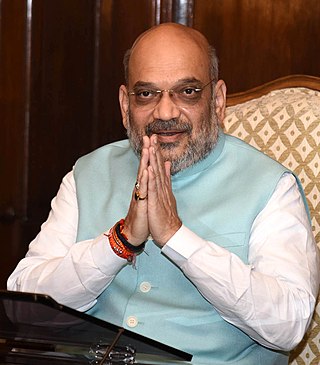
Amit Anil Chandra Shah is an Indian politician who is currently serving as the 31st Minister of Home Affairs since 2019 and the 1st Minister of Co-operation of India since 2021. He served as the 10th President of the Bharatiya Janata Party (BJP) from 2014 to 2020. He has also served as chairman of the National Democratic Alliance (NDA) since 2014. He was elected to the lower house of Parliament, Lok Sabha, in the 2019 Indian general elections from Gandhinagar. Earlier, he had been elected as a member of the upper house of Parliament, Rajya Sabha, from Gujarat from 2017 to 2019. A chief strategist of the BJP, he is a close aide to Narendra Modi.He was also the member of the Gujarat Legislative Assembly from Naranpura from 2012 to 2017 and Sarkhej from 1997 to 2012 and the Minister of State for Home, Law and Justice, Prison, Border Security, Civil Defence, Excise, Home Guards, Transport, Prohibition, Gram Rakshak Dal, Police Housing, Legislative and Parliamentary Affairs, Government of Gujarat in the Modi ministry from 2002 to 2012.
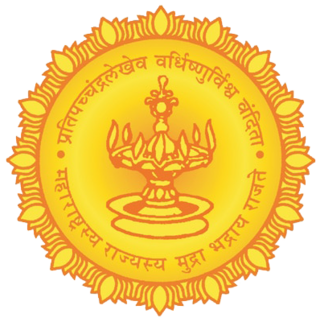
The Maharashtra Control of Organised Crime Act, 1999 is a law enacted by the state of Maharashtra in India in 1999 to combat organised crime and terrorism. Known as 'MCOCA', the Act provides the State Government with special powers to tackle these issues, including powers of surveillance, relaxed evidentiary standards and procedural safeguards, and prescribing additional criminal penalties, including the death penalty. The law was introduced by a coalition government of the Bharatiya Janata Party and Shiv Sena.
Indian Institutes of Information Technology (IIITs) are a group of 25 interdisciplinary technology-based-engineering research institutions in India which are focused on information technology. Five of them are established, funded and managed by the Ministry of Education (MOE). The other 20 are set up on the public-private partnership (PPP) model, funded by the central government, state governments and industry partners in the ratio 50:35:15.

The Aam Aadmi Party is a political party in India. It was founded in November 2012 by Arvind Kejriwal and his then-companions, following the 2011 Indian anti-corruption movement. AAP is currently the governing party in the Indian states of Delhi and Punjab. On 10 April 2023, AAP was officially granted the status of national party by ECI. The party's election symbol is a broom.
In early April 2018, lakhs of people belonging to Scheduled Castes and Scheduled Tribes (SC/ST) protested across India against an order of the Supreme Court on the Atrocities Act. In subsequent violence, 14 people died and hundreds were injured.
Karnataka Control of Organised Crimes Act, 2000 (KCOCA) is a law enacted by Karnataka state in India in 2000 to combat organised crime and terrorism. The Act was modeled on the Maharashtra Control of Organised Crime Act, 1999 (MCOCA).

Legislative Assembly elections were held in Uttar Pradesh from 10 February to 7 March 2022 in seven phases to elect all 403 members for the 18th Uttar Pradesh Legislative Assembly. The votes were counted and the results were declared on 10 March 2022.

Stray cows or stray cattle are animals such as cows, bulls, oxen and buffaloes that roam freely. A cow is considered "stray" when its owner no longer claims ownership or its owner cannot be determined.
References
- ↑ "UP Council select committee approves Uttar Pradesh Control of Organised Crime Act bill". The New Indian Express. India: The New Indian Express . Retrieved 5 August 2019.
- ↑ "Vidhan Parishad finally passes UP Control of Organised Crime Bill". Hindustan Times. India: Hindustan Times. 29 March 2018. Archived from the original on 6 April 2018. Retrieved 5 August 2019.
- ↑ Rashid, Omar (13 December 2017). "U.P. plans law against organised crime". The Hindu . India. Archived from the original on 13 December 2017. Retrieved 5 August 2019.
- ↑ "Yogi Adityanath's new weapon against crime in UP: What is UPCOCA and why opposition parties are dubbing it 'draconian'". The Financial Express. India: The Financial Express. 28 March 2018. Archived from the original on 28 March 2018. Retrieved 5 August 2019.
